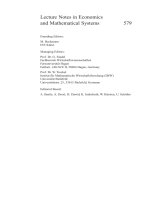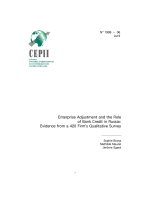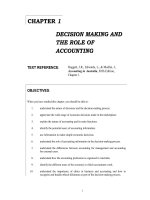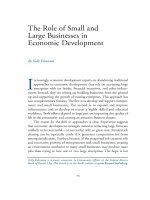Ph.D. Program in “Economics and Management” Accounting and governace The role of Corporate Disclosure docx
Bạn đang xem bản rút gọn của tài liệu. Xem và tải ngay bản đầy đủ của tài liệu tại đây (304.15 KB, 5 trang )
PhD Program in Economics and Management
Advanced Financial Accounting
Ph.D. Program in “Economics and Management”
Accounting and governace
The role of Corporate Disclosure
3
rd
Term
Saverio Bozzolan
Department of Economics and Management
Via del Santo, 33
E-mail:
Skype: Federica_francesca
Federica Ricceri
Department of Economics and Management
Via del Santo, 33
E-mail:
Skype: Federicceri
PhD Program in Economics and Management
Advanced Financial Accounting
Course description
Accounting information plays two important roles in market-based economies.
First, it allows capital providers (shareholders and creditors) to evaluate the
return potential of investment opportunities (the ex-ante or valuation role of
accounting information). Second, accounting information allows capital
providers to monitor the use of their capital once committed (the ex-post or
stewardship role of accounting information). Information asymmetry harms
these two main roles of accounting.
In this course we focus on disclosure as a way firms might use to reduce the
level of information asymmetries existing among market participants. Looking
at contemporary empirical financial accounting research, the course
introduces students to the main theories behind disclosure (from agency
theory – unrevealing principle – to cheap talk models) and to the main
empirical research themes in existing disclosure literature.
Emphasis will be placed on issues like the determinants behind a disclosure
choice, the characteristics of the discloser (i.e. credibility) and of the
information disclosed (i.e. verifiability) and how these characteristics interact
with the expected effects of the disclosure. Finally, particular focus will be
given to disclosure of narrative and non-financial information.
Grading
The grades will be based on the following components:
• Class participation, materials reading and comprehension: 20%
• Paper presentation and discussion: 30%
• Term Paper: 50%
Readings
Each student is supposed to have read the papers indicated in this syllabus
before attending the courses. Each student will be assigned specific
references (3 or 4 articles) that will be presented and discussed during the
course.
Term paper
Each student is expected to write a term paper on a topic relating to the
course. The topic will be decided together by the student and the instructors
before the end of the course. The paper could be a conceptual study
consisting in a literature review or in a meta-analysis or a research proposal
for an empirical study. In this case, the paper should contain a complete
literature review with the aim of identifying sound and relevant research
question(s), the research design and the methodology intended to address
the research question(s) The paper is expected to be between 6,000 and
10,000 words inclusive of all exhibits and references.
The deadline for the submission is the last day of the final exam period.
PhD Program in Economics and Management
Advanced Financial Accounting
Program
Classes 1 / 2: Disclosure theories (Saverio Bozzolan)
Akerlof G.A. (1970), The market for “lemons”: quality uncertainty and the market
mechanism, The Quarterly Journal of Economics, 84(3), 488-500
Skinner, D. (1994), Why firms voluntarily disclose bad news, journal of Accounting
Research, 32, 1, 38-60
Spence M. (1973), Job market signalling, The Quarterly Journal of Economics, 87,
355-374
Classes 3 / 4 : Determinants (Saverio Bozzolan)
Ahmed, K., Courtis, J.K. (1999), Associations between corporate characteristics and
disclosure levels in annual reports: a meta analysis, British Accounting Review, 31,
1–27
Garcia_Meca, E., Sánchez-Ballesta, J. (2010), The Association of Board Independence
and Ownership Concentration with Voluntary Disclosure: A Meta-analysis,
European Accounting Review, 19, 3, 603 — 627
Classes 5 / 6 : Characteristics (credibility and verifiability) (Saverio Bozzolan)
Hirst, D.E., Koonce, L, Venkataraman, S. (2007), How Disaggregation Enhances the
Credibility of Management Earnings Forecasts, Journal of Accounting Research,
45, 811-836
Mercer, M. (2004), How do investors assess the credibility of management
disclosures?, Accounting Horizons, 18, 3, 185-196
Rogers, J.L., Stocken, P. (2005), Credibility of management forecasts, The Accounting
Review, 80(4), 1233-1260
Class 7 : Impression management (Saverio Bozzolan)
Beattie, V., Jones M.J. (2002), The impact of graph slope on rate of change
judgments in corporate reports, Abacus, 38(2), 177-199
Merkl-Davies, D.M., Brennan, N.M. (2011), A conceptual framework of impression
management: new insights from psychology, sociology and critical perspectives,
Accounting and Business Research, 41, 5, 415-437
PhD Program in Economics and Management
Advanced Financial Accounting
Classes 8 / 9 : Non-financial information (Federica Ricceri)
Simpson, A. (2010), Analysts’ Use of Nonfinancial Information Disclosures,
Contemporary Accounting Research, 27, 1, 249-288
Classes 10 / 11 : Intellectual Capital Disclosure (Federica Ricceri)
Ricceri F. (2008), Intellectual Capital and Knowledge Management: Strategic
Management of Knowledge Resources, Routledge, London and New York, Chapter
2.
Classes 12 / 13 : Effects (Saverio Bozzolan)
Botosan, C.A., Plumlee, M.A. (2002), A re-examination of disclosure level and the
expected cost of equity capital, Journal of Accounting Research, 40(1), 21-40
Kothari, S.P., Li, X., Short, J.E. (2009), The effects of disclosures by management,
analysts, and business press on cost of capital, return volatility, and analyst
forecasts: a study using content analysis, The Accounting Review, 84, 5, 1639-
1670
Classes 14 / 15 : Methodology (Federica Ricceri)
Beattie, V. A., McInnes, B., Fearnley, S. (2004), A Methodology for Analysing and
Evaluating Narratives in Annual Reports: A Comprehensive Description Profile and
Metrics for Disclosure Quality Attributes, Accounting Forum, 28, 205–236.
Hooks J. and van Staden C. (2011), Evaluating environmental disclosures: The
relationship between quality and extent measures, British Accounting Review
43(3), 200-213.
PhD Program in Economics and Management
Advanced Financial Accounting
Guideline for presentations
Each student will provide a discussion (20 - 25 minutes) in which they are
expected to provide a summary, a critique and an evaluation of the relevance
for management behaviour of the assigned paper.
Each presentation is expected to provide a clear discussion in which the
motivation of the study, the strengths and weaknesses of the research design,
the main assumptions made and the main results are presented. Finally and
most importantly, the contribution of the paper to the literature needs to be
discussed and how the study could be improved and extended.
The presenter is also expected to provide examples from the practice
regarding the type of disclosures analyzed in the paper or, otherwise,
anecdotic / empirical evidence from the practice about the relevance of the
findings. The presenter should also be prepared to respond to questions
about the paper made by other students.
Specifically each student is expected to address the following six elements for
each paper:
1. What is the specific research question addressed?
2. Why is it important to the disclosure literature?
3. How is the research question being addressed?
4. What are the key findings and implications of the study?
5. How could the study be improved and extended?
Part of the grading is based on the active participation of each student to
other students’ presentations.









